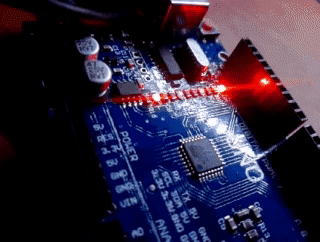Arduino CLI with ARM host (RPi)
Basically this the Arduino toolchains. With this tools you avoid write the Makefile and build with Arduino IDE. With this solution you can edit your Arduino Sketch (*.ino) with any text editor, vim, nano or whatever you use, and later compiler and deploy it. All over from your terminal!
Protip: If you're using vim, you can install Arduino syntax highlighting!
On this example, I show you how to download and configure Arduino CLI on an Raspberry 2 B with Raspbian OS. Theorically, this guide can used for install in any Linux architecture (with the correct build: ARM64, x86, x64).
IMPORTANT: this version is under development (alpha version), maybe you have a experience a unstable behavior!
First steps
First to all, you need download the latest version of Arduino CLI from the Arduino-CLI repo:
hst@rpi:~ $ wget https://downloads.arduino.cc/arduino-cli/arduino-cli_latest_Linux_ARMv7.tar.gzAfter that, uncompressed the file:
hst@rpi:~ $ tar -xvf arduino-cli_latest_Linux_ARMv7.tar.gzNow, move arduino-cli binarie to /usr/local/bin/:
hst@rpi:~ $ sudo mv arduino-cli /usr/local/binNow initialize the config file before you download the board index:
hst@rpi:~ $ sudo arduino-cli config init
hst@rpi:~ $ sudo arduino-cli core update-indexThis step if only you want install arduino:avr -> atmel mcu:m328p:m2560~!
Install the arduino:avr core (or whatever you need):
hst@rpi: $ sudo arduino-cli core install arduino:avr
...
Installing arduino:avr-gcc@4.9.2-atmel3.5.4-arduino2
arduino:avr-gcc@4.9.2-atmel3.5.4-arduino2 installed
Installing arduino:avrdude@6.3.0-arduino9
arduino:avrdude@6.3.0-arduino9 installed
Installing arduino:arduinoOTA@1.1.1
arduino:arduinoOTA@1.1.1 installed
Installing arduino:avr@1.6.21...
arduino:avr@1.6.21 installedArduino CLI is ready to compile and deploy your projects!
Connect your Arduino Board and verified if Raspbian recognized it:
hst@rpi: $ sudo arduino-cli board list
Discovering...
FQBN Port ID Board Name
/dev/ttyUSB0 1A86:7523 unknownNOTE: on this case, the Board Name is unknown because is an clone board.
First project
Create a new project:
hst@rpi:~ $ arduino-cli sketch new BlinkSerial
Sketch created in: /home/cyan0xff/Arduino/BlinkSerialNOTE: It's very important that sketch.ino is inside in a folder with the same name. This if you want create the project manually (mkdir sketch/ and touch sketch/sketch.ino).
Example sketch.
hst@rpi:~ $ vim ~/Arduino/BlinkSerial/BlinkSerial.ino
void setup() {
Serial.begin(115200);
pinMode(LED_BUILTIN, OUTPUT);
}
void loop() {
digitalWrite(LED_BUILTIN, HIGH);
Serial.prinln("Hello from Arduino!");
delay(750);
digitalWrite(LED_BUILTIN, LOW);
delay(150);
}
~
~
~Once time save your sketch, you need compile it:
hst@rpi:~ $ sudo arduino-cli compile -b arduino:avr:uno ~/Arduino/BlinkSerial/
...
Sketch uses 1990 bytes (6%) of program storage space. Maximum is 32256 bytes.
Global variables use 208 bytes (10%) of dynamic memory, leaving 1840 bytes for local variables. Maximum is 2048 bytes.NOTE: The parameter: arduino:avr:<\board> needs to be replaced by your Arduino board version!
Attach Arduino board and upload your code:
hst@rpi:~ $ sudo arduino-cli board attach serial:///dev/ttyUSB0 ~/Arduino/BlinkSerial/
hst@rpi:~ $ sudo arduino-cli upload -p /dev/ttyUSB0 --fqbn arduino:avr:uno ~/Arduino/BlinkSerial/It's all! Your Arduino is ready and execute your code!

Open minicom and listen the serial port with the baud 115200:
hst@rpi:~ $ sudo minicom -D /dev/ttyUSB0 -b 115200
...
...
Port /dev/ttyUSB0, 00:00:20
Press CTRL-A Z for help on special keys
Hello from Arduino!
Hello from Arduino!
Hello from Arduino!
Hello from Arduino!
Hello from Arduino!
Hello from Arduino!
Hello from Arduino!
Hello from Arduino!
...How to search and install libraries?
Arduino CLI provide a tool for search and install the same libraries of Arduino IDE (official repos).
Tip: You can use grep for filter the info.
hst@rpi:~ $ sudo arduino-cli lib search lcd | grep -i "Name:\|Paragraph:"
...
Name: "LcdEffects"
Paragraph: Underlining! Bold! Italics! This library lets you print all these and more on character LCDs.
Name: "LcdProgressBarDouble"
Paragraph: Depends on LiquidChrystal library.
Name: "FaBo 212 LCD PCF8574"
Paragraph: 16x2 LCD I2C module.
Name: "LcdBarGraph"
Paragraph: Using the bouned LiquidChrystal library, bar-graph can be displayed in the screen. See demo: http://youtu.be/noXtsvPRwQk
Name: "Parallax LCD"
Paragraph: It is known to work with Parallax LCD\'s (27976, 27977, 27979).
hst@rpi:~ $The same search, but only show the name lib.
hst@rpi:~ $ sudo arduino-cli lib search lcd | grep -i "Name:"
...
Name: "LcdProgressBar"
Name: "Grove - LCD RGB Backlight"
Name: "LcdBarGraph"
Name: "LCDMenuLib"
Name: "SparkFun Color LCD Shield"
Name: "CheapLCD"
Name: "DatavisionLCD"
hst@rpi:~ $Installing a lib, LcdProgressBar:
hst@rpi:~ $ sudo arduino-cli lib install LcdProgressBar
0 / 536477 [-----------------------------------------------------------------------------------------------------] 0.00%
LcdProgressBar@1.0.1 0 B / 523.90 KiB [--------------------------------------------------------------------------] 0.00%
LcdProgressBar@1.0.1 75.20 KiB / 523.90 KiB [=========>----------------------------------------------------------] 14.35%
LcdProgressBar@1.0.1 334.96 KiB / 523.90 KiB [==========================================>------------------------] 63.94%
LcdProgressBar@1.0.1 downloaded
Installed LcdProgressBar@1.0.1
hst@rpi:~ $And that's it, now you can add the lib in your .ino file!
Arduino CLI commands:
hst@rpi:~ $ sudo arduino-cli
Arduino Command Line Interface (arduino-cli).
Usage:
arduino-cli [command]
Examples:
arduino-cli <command> [flags...]
Available Commands:
board Arduino board commands.
compile Compiles Arduino sketches.
config Arduino Configuration Commands.
core Arduino Core operations.
help Help about any command
lib Arduino commands about libraries.
sketch Arduino CLI Sketch Commands.
upload Upload Arduino sketches.
version Shows version number of arduino CLI.
Flags:
--config-file string The custom config file (if not specified ./.cli-config.yml will be used).
--debug Enables debug output (super verbose, used to debug the CLI).
--format string The output format, can be [text|json]. (default "text")
-h, --help help for arduino-cli
Use "arduino-cli [command] --help" for more information about any command.